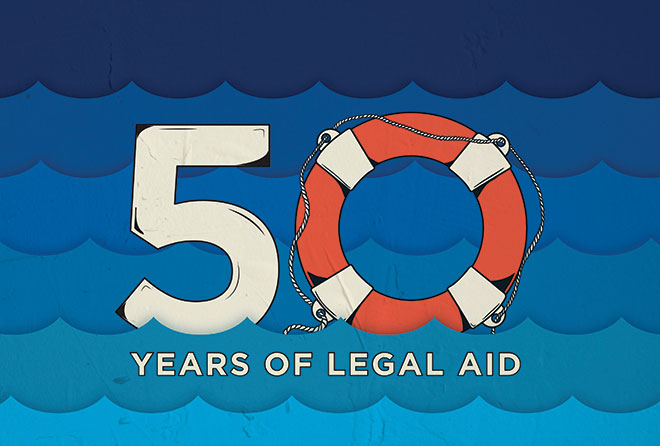
Since 1967, more than 1,300 students have cut their teeth in KU Law’s Legal Aid Clinic under the supervision of seasoned attorneys and faculty, working to secure “justice for and to protect the rights of the needy.”
The Fall 2017 issue of KU Law Magazine features a retrospective story marking the 50th anniversary of the Clinic. We received far too many fond recollections from alumni and staff to include them all in the print edition, so we’re sharing them here on our blog.
Have a story to share? Add it in the comments!
Randolph Starr, L’73
Starr & Westbrook PC | Loveland, Colorado
My world as a lawyer bloomed with Legal Aid. I was the first in my family to attend law school. I didn’t really know what lawyers did, and I had never been in a court or in a law office. I enrolled in the fall of 1970. I struggled in the beginning (not much writing instruction in business school). As I hit my stride in law school, I decided to try my hand at one of the law school’s clinical programs. Mike Davis and Louise Wheeler were the sponsors and helped guide us through representation of real clients. I remember my first DUI case for a third offender. It scared the pants off me to think that he would probably spend time in the Douglas County Jail (not a nice place). He was happy with his three-month sentence, and I learned how to deal with alcohol offenses.
My first real trial was a change-in-custody case. The trial was held in Kansas City, Kansas, since that was the original venue. Neither Mike nor Louise could go with me, so they arranged to have the head of the legal aid program in KCK sit at the table with me. Of course he knew nothing of the facts; I was on my own. I violated one of the first rules of examination of one of my witnesses in trying to rehabilitate his damaging testimony: I asked a question that I did not know the answer to. My client was successful in maintaining custody, and I had won my first litigated case. I was, thereafter, hooked.
My years of sports had prepared me for the thrill of victory and the agony of defeat. But to help out another person using my knowledge and understanding was addictive. Legal Aid changed my goal and purpose for the law. I became a civil trial attorney, and my fundamentals served me well over the many trials I had over the last 44 years. Mike Davis was an incredible mentor to me. Judge Gray was tolerant with the “kids” who would appear on dissolution cases. And I learned what a “sundowner” order from the municipal judge was to our local traveling population. I would put my education at KU up against any other place.
Chuck Briscoe, L’75
Director, Legal Aid Clinic, Fall 1999 – Fall 2012
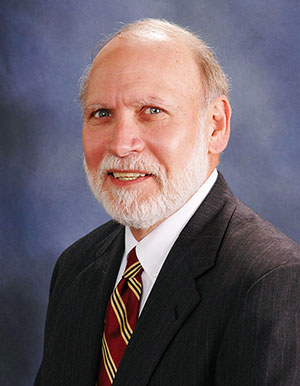 In the spring of 1995, while having coffee with friends in the Shawnee County Courthouse, one of the group mentioned a job posting for a supervising attorney in the Legal Aid Clinic. At the time, I had been practicing law for 20 years and I saw this as an opportunity to accomplish two of my professional goals: to teach soon-to-be attorneys how to practice law and to provide legal services to people who did not have the financial resources to hire counsel.
In the spring of 1995, while having coffee with friends in the Shawnee County Courthouse, one of the group mentioned a job posting for a supervising attorney in the Legal Aid Clinic. At the time, I had been practicing law for 20 years and I saw this as an opportunity to accomplish two of my professional goals: to teach soon-to-be attorneys how to practice law and to provide legal services to people who did not have the financial resources to hire counsel.
Dennis Prater was leaving the clinic, and Shelley Hickman Clark was succeeding him as the director. I had known Shelley since law school, and we had worked together in state government during Gov. John Carlin’s administration. As Shelly and I already had a good professional relationship, I was hopeful for the opportunity to join her in the clinic. Following the interview, I gladly accepted Shelley’s offer to become a supervising attorney.
I began working in the clinic in June 1995, joining Shelley, Stephanie Matthews and Barbara Wrigley, our office manager. With Shelley’s approval, I continued my private practice in Topeka. I asked for this concession because I did not want to leave my practice until I was certain the clinic would be a rewarding experience for the students and me. I also wanted to be confident our clients could be ably represented by a teaching clinic. By 1997, I knew that all of these conditions could be met and I closed my practice so I could work in the clinic full time.
In 1999, Shelley left the clinic to become the associate dean for KU Law. I became the director, and Suzanne Valdez joined us as a supervising attorney. Stephanie left the clinic in 2000, and Shelley later rejoined us. In 2003, Suzanne left and was eventually replaced by Jody Lamb Meyer in 2005. So the team from 2005 until my retirement on Dec. 31, 2012 was Shelly, Jody, Barbara Wrigley and me.
During my 17-year association with the clinic, it functioned as a small law firm with the supervising attorneys as the partners and our students as the associate attorneys. The firm’s practice consisted of domestic relations cases (which included divorce, annulment, paternity, protection from abuse and protection from stalking), defense of adults in municipal court and defense of juvenile offenders in district court.
We also represented clients in a variety of other matters, including landlord and tenant disputes, adoptions, guardianships, expungement of criminal convictions and juvenile offender adjudications, and preparation of wills.
From 1995 through 2012, approximately 370 students were enrolled in our program. Each student had an average caseload of 10 to 15 files, and the supervising attorneys were fully involved in each of the cases. On their first day in the clinic, the students were assigned to a supervising attorney and they received their case files. Often the students were overwhelmed during the first weeks of the semester when they were scheduled for court appearances shortly after arriving in the clinic.
Initially the supervising attorneys took the lead and the new students were second-chair observers. However, the goal of the supervising attorneys was to get the fledglings out of the nest as soon as possible, with a caveat: At no time would a student be placed in a position where the client’s interests might be jeopardized due to the student’s lack of experience.
Eventually the students settled in and the supervising attorneys were able to spend more time suggesting and directing case strategies. These discussions always included practical applications of the Codes of Civil and Criminal Procedure, statutory interpretation and legal research. During my tenure in the clinic, our students were required to enroll in the clinic for two semesters, and by the second semester they worked with more independence – to the mutual satisfaction of the supervising attorneys and the students.
The supervising attorneys were constantly teaching, in the clinic and in courtrooms. We had an open-door policy, which encouraged the students to ask questions and seek guidance at any time. It seemed the supervising attorneys always had a student standing at the doorways to their offices throughout the day, and we learned to work with constant interruptions.
Our law firm was very busy. From 1995 through 2012, we opened 7,484 files: 3,508 municipal court cases, 1,631 juvenile offender cases, 1,684 domestic relations cases and 661 miscellaneous civil cases. Most of our representation involved contested matters, and we were constantly in court. In our domestic relations practice, we did not hesitate to take contested cases involving issues such as child custody and domestic abuse. As a result, we were representing clients who were not only in need of legal representation, but also often in crisis.
A special tribute to Barbara Wrigley is in order here. She handled an unfathomable number of incoming telephone calls, many of which were from frantic clients, ran our court appearance calendar, scheduled office visits for clients, communicated with the courts, dealt with innumerable persons who came to the office without appointments, soothed many frustrated students (and an occasional frustrated supervising attorney), and so much more. Additionally, Barbara began working in the clinic in 1988, and her institutional memory was invaluable.
Although I enjoyed all of our areas of practice, I was especially proud of our representation of clients in contested domestic relations cases. While I was in the clinic, Kansas Legal Services had a limited presence in Douglas County, but it could not accommodate many clients. Therefore we felt the clinic had a moral obligation to accept as many domestic relations clients as we could, particularly in cases which involved either child custody or domestic violence. Without us, those clients would have to represent themselves in extremely difficult and stressful matters, often against retained counsel.
The large number of clients we represented is, in itself, significant, but more impressive was the quality of the legal services we provided. To put this into perspective, one has to consider that most of the students had no prior experience in interviewing clients, marshaling facts, maintaining case files, preparing and filing legal documents, negotiating with opposing counsel or appearing in court. Additionally, given the demands of their other law school classes, the students were not able to be in the clinic office full-time, so communication with clients and opposing attorneys was sometimes sporadic. When the students were not in the office, important phone calls and various crises had to be covered and resolved by the supervising attorneys. In addition, as our clients and cases did not pause for final exams, semester breaks and the summer (when our enrollment was lower), the supervising attorneys often had to assume full responsibility for some of the clients’ cases.
Through it all, our students gained experience by analyzing the facts and the law of each case, explaining possible options and outcomes to our clients, using negotiation in an attempt to resolve disputes and, when negotiation failed, advocating for our clients in trial. We were always prepared and professional, and we represented each of our clients to the best of our abilities. I marvel at all we accomplished given the constraints inherent in the representation of so many clients by law students who were just starting their legal training.
In the clinic, we taught basic legal skills to prepare our students to become counselors and advocates. They learned how to be organized, prepared, practical and compassionate, and they participated in numerous courtroom proceedings. There was no other course in the law school that provided similar training. I am confident that after graduation our students were better prepared to face their first days in practice having benefitted from their Legal Aid Clinic experience. As was said by a Confucian scholar, “What I hear, I forget; What I see, I remember; What I do, I understand.” And our students did a lot.
Jim Clark, L’75
Retired
I was a student director-in-training in the spring of 1974, and student director in fall of ’74 and spring of ’75, assigned to what was then Haskell Indian Junior College. At that time the Legal Aid office was located above Owens Flower Shop, as there was no room in Old Green Hall. At that office, not only did we have the constant scent of flowers, but often the smell of fresh donuts when someone dashed downstairs and next door to Joe’s Bakery. The office also had satellite locations at Haskell Indian Junior College, Ballard Place and Penn House, hence the need for student directors. While we were legal interns, we still needed supervision by practicing attorneys. The director of the Legal Aid Clinic, then Professor Louise Wheeler, followed by Professor Deanell Tacha, provided much of the court supervision, but we were also assigned to members of the Douglas County Bar Association. While representing clients in civil matters in district court and criminal matters in municipal court were challenging, often our biggest challenge was coordinating our cases with the schedule of our supervising attorney.
Nathan Harbur, L’77
Nathan C. Harbur, Chartered | Leawood, Kansas
I was a Legal Aid intern during the summer before and during my third year of law school. I was in the class of ’77. A big thanks to Deanell Tacha for choosing me as an intern. Having the guidance of an experienced mentor, an office and support as an intern were very inspiring to me. My experiences in the Clinic allowed me to better understand what practicing law in a small office was like and definitely confirmed my desire to represent regular people as a young lawyer.
Gary Pomeroy, L’84
Kansas Department for Children & Families | Kansas City, Kansas
I did Legal Aid during the summer of 1983. I was the first one of my group to appear in front of Judge George Catt, the municipal court judge. My client was charged with some alcohol-related violation. Judge Catt then asked me to state the appearances. I had no idea what he was asking me to do. So I did what I always do when confused and flustered: I improvised. I said, “I believe we are all here, your honor.” At which point the supervising attorney realized what was happening, stepped in and formally entered our appearances. She then pulled everyone else out into the hallway (this was when Municipal Court was roughly where Division 2 is in the Douglas County Courthouse now) and explained to them what to say and how to enter one’s appearance.
The following Thursday morning, we were back in Municipal Court for the criminal misdemeanor docket. I was again the first of my group up.
Before Judge Catt asked me to enter the appearances, he looked down from the bench, recognized me from the week before, and asked, “Counselor, are we all here?”
I bumped into Judge Catt at the Douglas County Courthouse shortly before he retired from the Municipal bench in 1998. I reminded him of our first meeting, and he responded, “That was you?” He then told me I had provided him with many free drinks based on the story of our first meeting.
Marty Brown, L’86
Farmers Corporate Legal & Foremost (a Farmers subsidiary) | Michigan
 I participated in the Legal Aid Clinic in 1985-86, and it was a very memorable, influential and rewarding experience. Dennis Prater was the director. Dennis was a great mentor and teacher. I’ll never forget my first client, though I can’t recall her name, who was blind and had both legs amputated below the knees, both a result of diabetes. My job was to get her Social Security Supplemental Income payments restored. I went to visit her in a nursing home on the southwest side of Lawrence, not far from where I was living on south Ousdahl. As is often the case with government bureaucracy, her situation was due to a comedy/tragedy of errors. I made several visits to the Social Security office with various documents to show my client’s plight. While the Social Security folks were nice and understanding, they had their procedures and I had to cross all the T’s and dot all the I’s. After a few weeks, my client’s SI payments were restored.
I participated in the Legal Aid Clinic in 1985-86, and it was a very memorable, influential and rewarding experience. Dennis Prater was the director. Dennis was a great mentor and teacher. I’ll never forget my first client, though I can’t recall her name, who was blind and had both legs amputated below the knees, both a result of diabetes. My job was to get her Social Security Supplemental Income payments restored. I went to visit her in a nursing home on the southwest side of Lawrence, not far from where I was living on south Ousdahl. As is often the case with government bureaucracy, her situation was due to a comedy/tragedy of errors. I made several visits to the Social Security office with various documents to show my client’s plight. While the Social Security folks were nice and understanding, they had their procedures and I had to cross all the T’s and dot all the I’s. After a few weeks, my client’s SI payments were restored.
While that was my first, and the most memorable of my LAC experiences, there were a lot more and I learned a lot about the actual practice of law. Of all my law school classes, there is no doubt that the Legal Aid Clinic is the class from which I received the most benefit. I interacted with many clients, made my only jail visit (to interview a client), had several court appearances, prepared many pleadings and did a ton of legal research, all of which were very beneficial to me in my post-Lawrence career.
Brian McLeod, L’89
City of Wichita | Wichita, Kansas
I was in the Legal Aid Clinic in the late ’80s, when Dennis Prater was director. In the large file room we called “The Bullpen,” there were a couple of old typewriters and a copy machine, none of which worked very well. Barb Wrigley was the only secretarial support for the whole office, and if we needed her help, we had to get stuff to her quite a while in advance. It was useful practical experience. I worked on a number of misdemeanor defense cases, some DUIs, a handful of interesting domestic cases with parentage, custody and property division issues, and one step-parent adoption. The report forms were a useful mechanism for keeping track of cases and, of course, conflict checking, client interviews and reporting to a supervisor apply in some form in most small law offices.
Peggy Rowe, L’90
Commerce Bancshares Inc. | Kansas City, Missouri
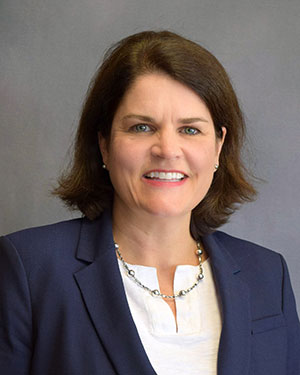 I participated in the Legal Aid Clinic in my third year (1989-1990). I really enjoyed the experience. One thing I remember, and the story I tell all of the time is:
I participated in the Legal Aid Clinic in my third year (1989-1990). I really enjoyed the experience. One thing I remember, and the story I tell all of the time is:
During our “orientation” to the Clinic, Professor Prater told us something very empowering: “There is nothing you can do that I can’t undo.” That sentence empowered the participants to have no fear of failure, or at least no fear that a “failure” would be detrimental to a client. That grant of freedom also empowered us to be willing to take on any issue/matter. What is interesting is the experience I had in the Clinic was foundational to the work I do today. The skills I learned related to reviewing a matter (triage), understanding the law associated with the matter and offering solutions defines my daily work as deputy general counsel with Commerce Bancshares Inc. Today I am offered the opportunity to handle a wide variety of matters for our company, and that variety of work is one of the many reasons I love my job. While I am not handling criminal work or spending much time in the courtroom, meeting the challenge of handling a variety of matters began in the Legal Aid Clinic.
Tanya Rodecker Wendt, L’05
Deacy & Deacy LLP | Kansas City, Missouri
I was part of the Legal Aid Clinic during the 2004-2005 academic year. I feel like I gained so much from the Legal Aid Clinic, from appearing in court, to preparing documents, to meeting with clients. It provided me my first real-life experiences of being a litigator, and it gave me a venue to apply the skills I was learning about in my litigation classes. I also value the friendships I made with members of my class who I had not otherwise crossed paths with during our first two years of law school, some of whom are still close friends today. The Clinic is certainly one of my favorite memories of law school.
I’d like to share a story: I had a woman come in who was wanting a divorce. We went through our intake and proceeded to prepare papers for her. The next time she came in, she had a newborn baby with her. The fact that she was pregnant was never mentioned in our prior meetings and conversations. So we politely commented that we would have to make changes to the papers to account for the child, to which the client replied, “Oh, my husband is not the father.” To her, the child was not a factor in the divorce because they had been separated for some time. Little did she know, Kansas law presumes the husband to be the father, so it did matter. What is crazy is this happened to me a second time! A woman came in requesting a divorce, came back to sign the papers with a newborn, but the child was not her husband’s so she thought it did not affect the divorce proceedings. And no, I was not oblivious to their mid-sections. Both of these women carried their babies in such a way that it was not obvious that they were pregnant. After that, we changed the divorce intake form to ask if the client was currently pregnant. Lesson learned.
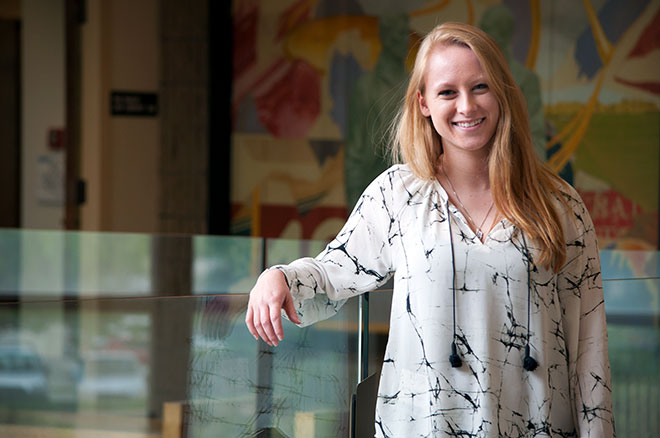
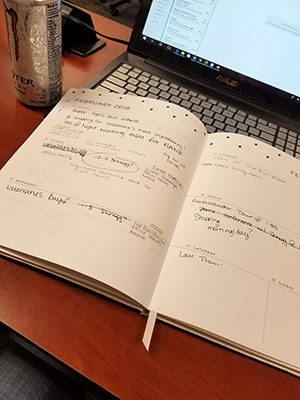 I am not an organized person. I am perpetually running around like a crazy person trying to figure out where I need to be and when. A calendar minimizes my worry and allows me to organize my schedule in such a way that I can maximize my time. I like when my calendars have a monthly overview with the weeks expanded to allow detailed notes. I recommend finding a style that works for you and then using it to its fullest capacity.
I am not an organized person. I am perpetually running around like a crazy person trying to figure out where I need to be and when. A calendar minimizes my worry and allows me to organize my schedule in such a way that I can maximize my time. I like when my calendars have a monthly overview with the weeks expanded to allow detailed notes. I recommend finding a style that works for you and then using it to its fullest capacity. I am not a gym rat. I hate cardio. But as a law student, I use school as an excuse to avoid working out way more than I should. (NOTE: I make time for “Criminal Minds.”) Taking walks is an easy and relaxing way to get moving. Again, this is something you kind of need to plan. But, honestly, a 45-minute walk is shorter than most of my grocery shopping trips and the length of one Netflix episode.
I am not a gym rat. I hate cardio. But as a law student, I use school as an excuse to avoid working out way more than I should. (NOTE: I make time for “Criminal Minds.”) Taking walks is an easy and relaxing way to get moving. Again, this is something you kind of need to plan. But, honestly, a 45-minute walk is shorter than most of my grocery shopping trips and the length of one Netflix episode.
 In the spring of 1995, while having coffee with friends in the Shawnee County Courthouse, one of the group mentioned a job posting for a supervising attorney in the Legal Aid Clinic. At the time, I had been practicing law for 20 years and I saw this as an opportunity to accomplish two of my professional goals: to teach soon-to-be attorneys how to practice law and to provide legal services to people who did not have the financial resources to hire counsel.
In the spring of 1995, while having coffee with friends in the Shawnee County Courthouse, one of the group mentioned a job posting for a supervising attorney in the Legal Aid Clinic. At the time, I had been practicing law for 20 years and I saw this as an opportunity to accomplish two of my professional goals: to teach soon-to-be attorneys how to practice law and to provide legal services to people who did not have the financial resources to hire counsel. I participated in the Legal Aid Clinic in 1985-86, and it was a very memorable, influential and rewarding experience. Dennis Prater was the director. Dennis was a great mentor and teacher. I’ll never forget my first client, though I can’t recall her name, who was blind and had both legs amputated below the knees, both a result of diabetes. My job was to get her Social Security Supplemental Income payments restored. I went to visit her in a nursing home on the southwest side of Lawrence, not far from where I was living on south Ousdahl. As is often the case with government bureaucracy, her situation was due to a comedy/tragedy of errors. I made several visits to the Social Security office with various documents to show my client’s plight. While the Social Security folks were nice and understanding, they had their procedures and I had to cross all the T’s and dot all the I’s. After a few weeks, my client’s SI payments were restored.
I participated in the Legal Aid Clinic in 1985-86, and it was a very memorable, influential and rewarding experience. Dennis Prater was the director. Dennis was a great mentor and teacher. I’ll never forget my first client, though I can’t recall her name, who was blind and had both legs amputated below the knees, both a result of diabetes. My job was to get her Social Security Supplemental Income payments restored. I went to visit her in a nursing home on the southwest side of Lawrence, not far from where I was living on south Ousdahl. As is often the case with government bureaucracy, her situation was due to a comedy/tragedy of errors. I made several visits to the Social Security office with various documents to show my client’s plight. While the Social Security folks were nice and understanding, they had their procedures and I had to cross all the T’s and dot all the I’s. After a few weeks, my client’s SI payments were restored. I participated in the Legal Aid Clinic in my third year (1989-1990). I really enjoyed the experience. One thing I remember, and the story I tell all of the time is:
I participated in the Legal Aid Clinic in my third year (1989-1990). I really enjoyed the experience. One thing I remember, and the story I tell all of the time is: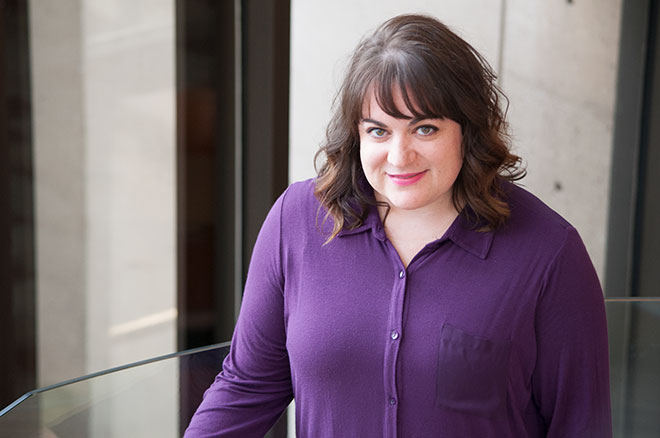
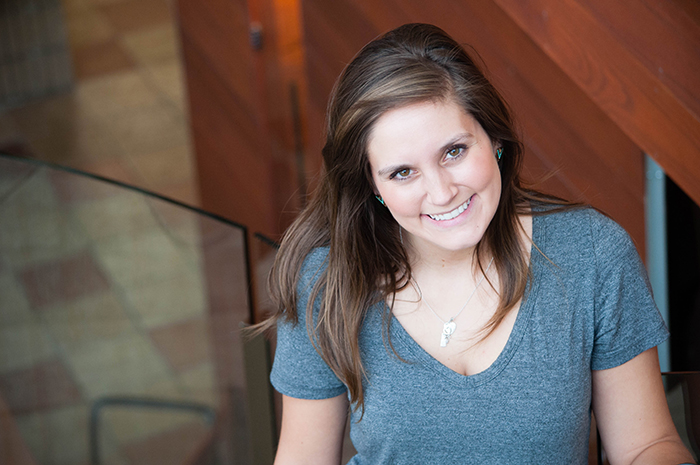
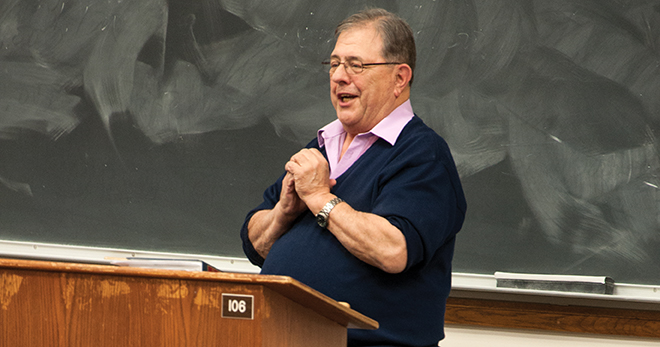
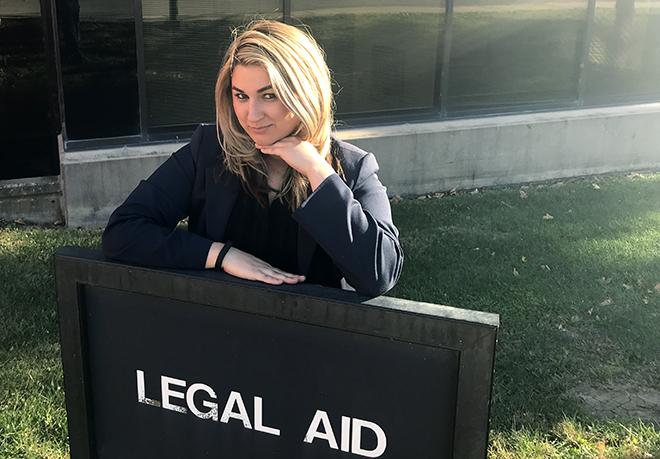
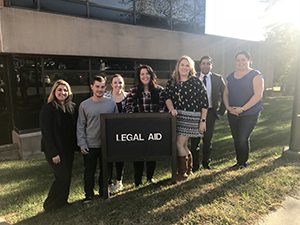 Legal work can be stressful, but the lawyers at my internship last summer were friendly and helpful. They created a calming atmosphere that I feared would not be possible in the Legal Aid Clinic, with competitive law students as interns. That has not been the case. Working in the Legal Aid office is the best part of my week. Almost every time I walk in, I’m greeted with a smile and friendly “Good morning, Rayven” from Barb Wrigley, which starts my day off great. I have worked with two amazing supervising attorneys and some of the most inspiring law students in Green Hall.
Legal work can be stressful, but the lawyers at my internship last summer were friendly and helpful. They created a calming atmosphere that I feared would not be possible in the Legal Aid Clinic, with competitive law students as interns. That has not been the case. Working in the Legal Aid office is the best part of my week. Almost every time I walk in, I’m greeted with a smile and friendly “Good morning, Rayven” from Barb Wrigley, which starts my day off great. I have worked with two amazing supervising attorneys and some of the most inspiring law students in Green Hall.